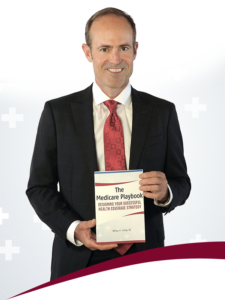| April 2022 | MediGap Advisors Health & Wealth Newsletter | Vol. 18, Issue 4 |
How to Protect Yourself from Medicare Fraud and Medicare Scams
There are people like this all across the country: villains who pose as healthcare professionals to steal from Medicare beneficiaries. In most cases, they’re just trying to steal the health plan that you’re paying for.
Or perhaps they’re targeting Medicare directly, with fraudulent reimbursements that, in the end, only drive plan rates up even further.
But more and more, Medicare scammers and fraudsters are getting access to personal information, medical history, and even checking accounts, posing a direct and critical threat to enrollees across the country.
Protecting yourself is essential, but it isn’t complicated.
Here’s what you need to know:
Spotting the Most Common Medicare Scams
1.) The “Update Your Medicare Card” Call.
You get a phone call from someone claiming to be with Medicare, telling you that it’s time to update or renew your Medicare card. They’ll ask for all the personal identifying info they can get, including your SSN, your Medicare Number, and even your credit card info.
Defense: Know that the only time Medicare will call you is if you called 1-800-Medicare and specifically requested a return call. Your new Medicare Card is updated and mailed out automatically. Anyone who calls that tells you otherwise is likely a scammer.
2.) The “No-Cost Equipment or Supplies” Call
This is another way that scammers try to steal your identifying information. They tell you that their product or service is now available to you for free through Medicare. Lately, this is things like knee braces, genetic testing, and free COVID tests.
All they need is your Medicare number to get started, and a credit card number to cover the shipping. Don’t fall for it.
Defense: If someone calls you offering free medical supplies or equipment, and it sounds a little too good to be true, then it probably is. Talk to your doctor about sourcing the supplies and equipment you need.
3.) The “Collect Your Refund’ Call
These guys can sound very professional when telling you that Medicare rules have changed, and because of it, you’re now entitled to a healthy refund. They will usually ask for your bank account info so they can “deposit the funds right away.”
Defense: Medicare only sends things through the mail.
4.) The “Door to Door” Visit
This is when someone actually shows up at your door claiming to represent Medicare, or maybe a medical equipment company.
This is a particularly vile brand of scammer that will use charisma, charm, and misinformation to solicit personal and financial information from beneficiaries. Particularly, they’re usually after the older and more vulnerable ones.
Defense: Medicare never sends people door to door. If someone shows up asking for any personal info at all, send them packing.
Common Examples of Medicare Fraud
While Medicare scams are usually perpetrated by individual actors, Medicare Fraud is often perpetrated by the largest pharmaceutical companies, medical providers, and device manufacturers in the country.
While this isn’t a direct threat to Medicare Beneficiaries, the billions of dollars lost to Medicare fraud are partially responsible for why rates keep going up and up.
- Double Billing: A doctor, pharmacist, or other healthcare worker deliberately charges Medicare twice for a service that was only provided once.
- Upcoding: Common with traditional health insurance scams as well, Upcoding is when a physician alters the billable service code to get a higher reimbursement from Medicare.
- False Price Reporting: False price information is provided to Medicare in order to get a higher reimbursement.
- Kickbacks: An illegal way for pharmaceutical companies or other health equipment businesses to use things like hotel stays, free rent, or even just cash in order to ‘buy’ access to more patients.
Reporting Medicare Scammers and Fraudsters
Fighting Medicare fraud is about more than just protecting your own information. It’s also about protecting our vulnerable friends and loved ones from schemes that can wipe out someone’s retirement savings in one fell swoop.
The easiest way to report a Medicare fraud or scam is to call 1-800-MEDICARE (1-800-633-4227).
More Ways to Stay Protected
- Always keep your Medicare card in a safe place, and protect your Medicare number. When your new card arrives automatically, use a document shredder to destroy the old one.
- Track your healthcare over the course of the year in a simple calendar. Every so often, check this calendar against your Medicare statements to see if there is anything that doesn’t belong.
- Beware of anyone who is offering free or low-cost screenings, health tests, products, or supplies and says all they need is your Medicare number. Consult with your doctor to source Medicare-covered products.
- Be highly wary of anyone who is asking for bank account or credit card information over the phone.
- Never purchase a health plan that is advertised on one of those cheap flyers than come in the mail every fall. Rely on your Personal Benefits Manager to help you filter out the scam plans and enroll in something safe and legitimate.
To your health and wealth,


Wiley P. Long, III
President – MediGap Advisors

